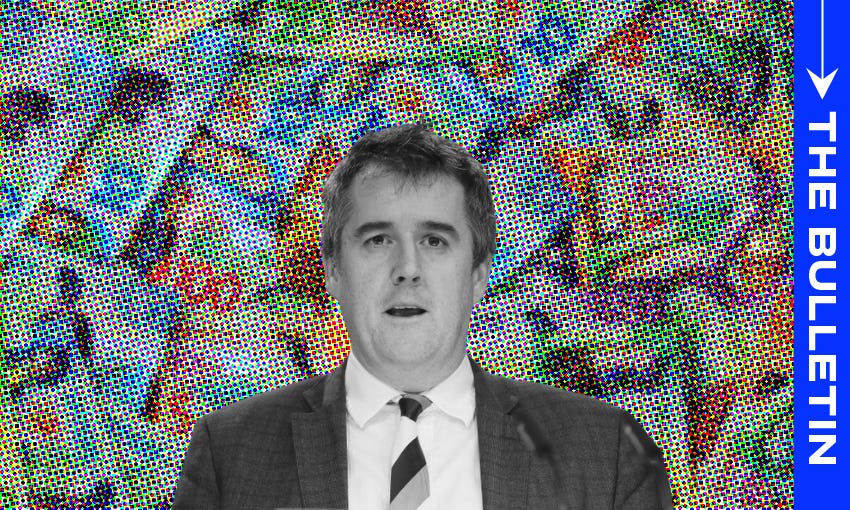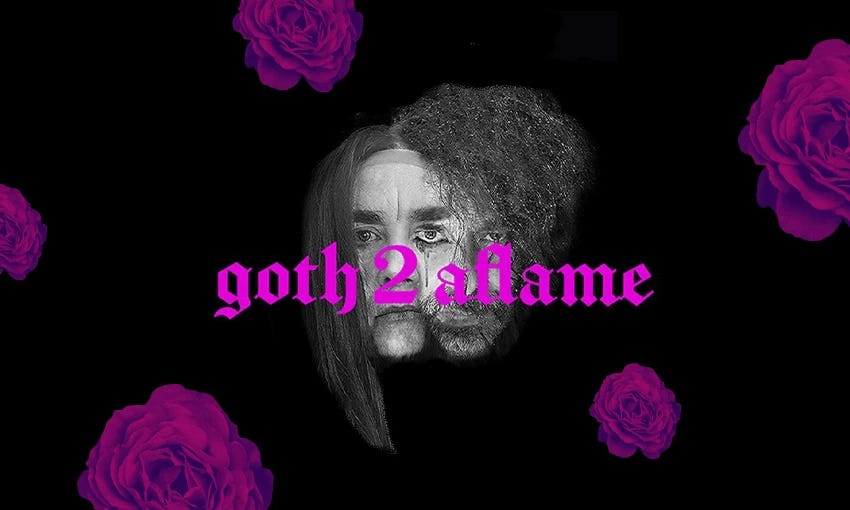The sudden death of the first home grant
It helped me buy my first home. Why the government says the scheme has now outstayed its welcome.
Mōrena, and welcome to The Bulletin for Thursday, May 23, produced in partnership with Blind Low Vision NZ.
In today’s edition: The UK is heading to the polls, a budget boost for youth counselling, and Shane Jones wants more mining – to save the planet? But first: the end of first home grants, and how the government defended it.
A sudden move
Well that didn’t take long. On Tuesday night, Newshub’s Jenna Lynch reported that the government was poised to scrap the first home grant scheme in next week’s budget. By yesterday morning, other outlets including The Post and RNZ had received the same tip. And at 1pm yesterday afternoon, an advisory informed media that a pre-budget announcement would be made by housing minister Chris Bishop on parliament’s black and white tiles just half an hour later. It was then that Bishop confirmed that the grant, which provided up to $10,000 towards a first home for an individual, had indeed been scrapped. Applications closed immediately and $140m of the savings from ending the scheme – about $245 million over four years – will be used as part of Budget 2024 to fund 1,500 new social housing places via community housing providers.
The balance between good policy and good vibes
As someone who very recently used the grant to buy my first home, I feel incredibly fortunate with the timing. For me, that additional grant money was the difference between purchasing a house or staying in a rental. And I wasn’t alone. Stuff’s Glenn McConnell reported that 12,000 people were approved to receive a grant last year, and since June 2017, 87,000 have been paid out. In a first home buyers Facebook group, one prospective homebuyer called the news devastating. “Looks like the dream is shattered,” they wrote. “We were counting down the days to apply for the grant.” RNZ’s Katie Scotcher has another story like this today, speaking to a Taupō man that was intending to submit his paperwork for the grant on the same day applications closed. But while these individual instances suggest the first home grant was helpful on a case-by-case basis, the counter argument is that it was poor economic policy, as economist Brad Olsen told McConnell. “It was a subsidy on buying a house, and because of how inelastic housing is, that subsidy really was bidding up prices,” Olsen said. “I am torn… from an economist’s point of view it was not good policy. But at least it did something for first home buyers.” Bishop also argued the scheme was inefficient, reported RNZ, saying evidence showed that while the grant brought forward the purchase of a new home, “in most cases it does not make a difference to whether someone can buy a home or not”.
The fallout
As Newshub’s Jenna Lynch noted last night, the government had never signalled its intention to scrap the grants and certainly did not campaign on it. In fact, National had previously argued for raising the first home grant and as recently as 2021 criticised Labour for the cap being too low. Bishop said that was then, and this is now. "We have just had to front the fiscal conditions that we are in," Bishop said. But Labour’s housing spokesperson Kieran McAnulty called the move a kick in the guts for first homebuyers and said Bishop was out of touch, as The Post reported. “I don't think he gets how important this is for a lot of people, how hard it is to buy a home.” Also writing for The Post, Luke Malpass said it was risky any time a government ditched so-called “free money” policies. But, he said, the move showed the government was serious about investing in things that delivered the “best bang for buck”. As such, Malpass said it would be interesting to keep an eye on the fate of the last government’s free prescriptions scheme in the upcoming budget, “a subsidy which has a far greater public health rationale”.
On the same day, a stagnant cash rate
For those who already own a home, yesterday’s biggest news came about half-an-hour after Bishop’s pre-budget announcement. The Reserve Bank revealed, as had been expected, that it was keeping the official cash rate at 5.5%. Interest’s David Hargreaves broke down what it meant, with the Reserve Bank signalling it could raise interest rates in the future. The central bank also pushed back when it expects to see inflation get back into the targeted range of 1% to 3%, picking the fourth quarter. None of this was overly surprising, though Kiwibank’s economists called the tone of the bank’s commentary “more hawkish than expected”, but it nevertheless provides a gloomy entree to the government’s budget. Luke Malpass at The Post has analysis of this as well.
As The Herald’s Audrey Young noted earlier in the week, there have already been a lot of pre-budget speeches. The most recent of these was from Labour’s Barbara Edmonds, whom Young said delivered the best of the bunch. Next up is finance minister Nicola Willis who will speak to the EMA in Auckland later this afternoon.
More budget reading: Max Rashbrooke explains why National prefers the phrase ‘tax relief’ to the more standard – and accurate – ‘tax cuts’
A cult classic comedy in an all-new local staging
Touring Auckland, Wellington and Christchurch from May 30, the NZ Opera season of Rossini’s Le comte Ory brings new life to a satirical masterwork. Led by acclaimed director Simon Phillips, and with a cast featuring Manase Latu, Emma Pearson and the return of Sol3 Mio’s Moses Mackay, opera-lovers and the opera-curious alike will find plenty to love in this effervescent contemporary interpretation.
Group, senior, student and $40-under-40 deals available – book today! (sponsored)
Budget: $24m for Gumboot Friday
This would have been the biggest budget story of the day, were it not for the decision to scrap first home grants. The government confirmed new funding for Mike King’s Gumboot Friday ahead of next week’s budget, fulfilling a pledge inked into the coalition deal between National and New Zealand First. The announcement, made yesterday by mental health minister Matt Doocey and New Zealand First leader Winston Peters, confirmed $24m would go towards the charity over the next four years. As reported by The Post, the funding will go to King’s I Am Hope foundation to deliver free counselling for young people aged five to 25. King promised that none of the money would go to himself and “every single cent” would help bring onboard another 300 counsellors to add to the charity’s current pool of 555. There’s a lot of noteworthy backstory on why King’s charity was chosen for this cash injection – I’ll take a closer look at that in a future Bulletin.
The UK is heading to the polls
We have a date. The United Kingdom will head to the polls on July 4, a rain-soaked Rishi Sunak has announced overnight. The BBC is running a live blog, which shows Sunak, standing outside Downing Street at the full mercy of the weather and protesters. “More drenched and drowned-out than poised and prime ministerial,” was how the surprise announcement was described. The Guardian has an explainer on what has been announced and why it was announced today, suggesting the prime minister opted to call an election because the UK economy was on the up, with inflation falling to its lowest level in nearly three years. The opposition, meanwhile, has argued the economy is stalling. Labour’s Keir Starmer is the frontrunner to become the next prime minister, with his party 20 points up in the polls.
Join The Spinoff Members
“I was a student for so long, and really appreciated the fact there wasn't a paywall. Signed up to be a member about a month after my first 'real job' pay check.” Bea, new Spinoff Member.
Help us keep our writing as accessible as possible, please consider becoming a member today.
Click and Collect
On the front page of The Press and The Post, Andrea Vance has details of Shane Jones’ plans to double billion-dollar mining industry exports within a decade.
Former justice minister Kiri Allan made a surprise guilty plea on the first day of what was meant to be a judge-only trial. For more, The Post reported on the night that ended Kiri Allan’s political career.
Invercargill’s prized tuatara Henry is getting a new home, beginning with Henry’s Housewarming on June 8. If you don’t know Henry, you should.
I’ve been a little bit slack at covering the situation with New Zealand Rugby. Dylan Cleaver at The Bounce has more, for subscribers.
The government paid its Kāinga Ora reviewers out of an urgent housing fund, reports Newsroom Pro’s Tim Murphy (paywalled).
There’s a new episode of The Spinoff’s Gone by Lunchtime, live from the Auckland Writers Festival. If you couldn’t be there in person, listening with some good headphones makes it feel like you were in the room. Enjoy!
Joel MacManus reviews Jemaine Clement's new comedy band, which could be great even if the opening night was a disaster. Illustrator Jo Pearson considers the picture book that nails it for The Spinoff Books Confessional. Gabi Lardies explains BDS, the boycott movement more effective at helping Palestinians than blocking celebrities on social media. Oscar Francis writes about the police pistol that got lost in a Manawatū weed patch.
Pop culture picks, with Alex Casey
The Spinoff’s senior writer gives her weekly reading list from the world of entertainment.
Do you have the time to listen to me whine about how good this achingly long oral history of Green Day’s ‘Dookie’ is? “There’s a part of us that was taking the piss out of everything that we did back then… this is going to end tomorrow anyways.”
The reviews just keep coming for Francis Ford Coppola’s $120 million self-funded green out. “A work of absolute madness”? “An ungainly epic”? “Megabloated and megaboring”? I’ll grab a medium popcorn and a Frozen Coke, thanks.
Loved reading this story about Vincent Ward's restored short film following the 'witch' of Wairarapa. “She did remarkably fine embroidery but could also confidently chop the head off a chicken.” Again, a medium popcorn and a Frozen Coke, thanks.
That’s it for today, thanks for reading. I’ll catch you tomorrow morning.
Got some feedback about The Bulletin, or anything in the news? Get in touch with me at thebulletin@thespinoff.co.nz.
If you liked what you read today, share The Bulletin with friends, family and colleagues.

















It’s been fascinating (?) to read commentary on various platforms responding to the announcement of the funding for I am Hope/Mike King. The most salient point (which I agree with) is: instead of this money going to a charity, why not start with actually investing in the public mental health services the government is supposed to be providing?
Other comments decry the lack of transparency of the services provided by the charity. Apparently, only 2 assessment sessions, followed by a maximum of 2 follow-up sessions. While arguably, it’s better than nothing, there’s a counter position acknowledging that assessment with no real follow through is potentially more damaging, especially when there’s limited options for where to go next once said assessment is complete.
A plethora of comments are more negative, presenting opinions on how difficult (NB: euphemism!) King is to work with and for, while yet others regard it as ‘hush money’ (learning from the Labour government’s lack of funding for the charity).
I’ll be fascinated to see if the same level of scrutiny on outcomes will be held here as the coalition is vocally supporting in other areas.
Re: First Home Grants. Absolutely shocking. If part of the rationale is shoring up a “fiscal cliff” (I.e., the money won’t be needed until June 2025), why does it need to be shut down immediately?
Kia ora for your mahi Spinoff whānau!
The large and unaccountable grant to Gumboot Friday is not good news. It is an unsafe model which does not meet regular ethical or procurement standards. Young people needing mental health support can choose a counsellor from a list. The counsellor needs to be a member of a professional association but may not have any specialist counselling skills with young people. They can charge whatver they want which Gumboot Friday will pay for but the flaw is that it is only for two sessions. Two sessions is barely enough to built trust let alone deal with trauma even if the counsellor is a good fit. But the young person will have to pay for any further sessions. Occasionally Gumboot Friday will pay for another session but that requires GF management to see confidential information about the young person. It is an unethical system with high risks for both young people and counsellors.